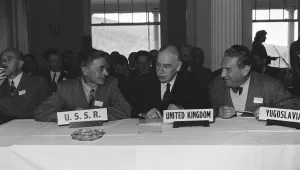International Security is America's leading peer-reviewed journal of security affairs.
Abstract
Why has no state or coalition of states emerged to counter U.S. global primacy? Is U.S. power so overwhelming that it will be decades before a credible challenger emerges? Perhaps the answer lies in geography: The physical isolation of the United States from potential challengers renders it relatively nonthreatening. Or maybe states have chosen cooperation over confrontation in exchange for the United States agreeing to limit the exercise of its power. John M. Owen, IV, of the University of Virginia has another explanation for the enduring unipolarity of the United States. Owen theorizes that “the degree to which a state counterbalances U.S. power is a function of how politically liberal that state is” and that liberal states tend to treat one another benignly. This explains why neither Japan nor states in Western Europe are counterbalancing the United States. It also explains why China, with its antiliberal regime, will continue to challenge U.S. unipolarity.
Owen, John. “Transnational Liberalism and U.S. Primacy.” Winter 2001/02
The full text of this publication is available in the link below.





